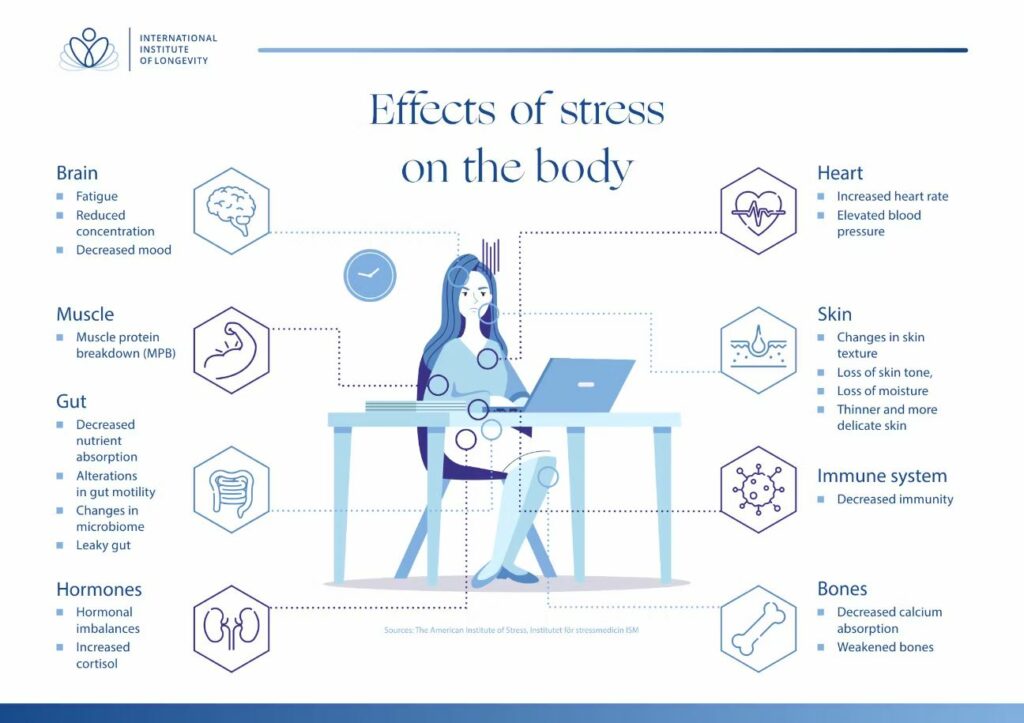In the hustle and bustle of modern life, stress has become an ever-present companion. From work pressures to personal challenges, the effects of stress on our well-being are profound and far-reaching. But what about its impact on longevity and our bodies? Let’s delve into the intricate web of stress and explore how it weaves into the fabric of our existence, affecting not only our daily lives but potentially shaping the length and quality of our time on this planet.

The Stress Response
At its core, stress triggers a cascade of physiological responses known as the “fight or flight” response. While this mechanism is vital for survival in immediate, life-threatening situations, chronic stress can wreak havoc on our bodies. The release of stress hormones, such as cortisol and adrenaline, becomes a persistent undercurrent, influencing various systems within us.
A recent research has explored the positive effects of mindfulness-based stress reduction (MBSR) interventions. Studies, including those published in the “Journal of Alternative and Complementary Medicine,” demonstrate the efficacy of mindfulness practices in reducing stress-related symptoms and improving overall well-being.
Telomeres and Cellular Aging
Research suggests a fascinating link between stress and cellular aging, particularly in the context of telomeres. Telomeres are protective caps at the end of our chromosomes, and they naturally shorten as we age. Chronic stress has been associated with accelerated telomere shortening, potentially contributing to the cellular aging process. Understanding this connection prompts us to consider stress management not just for a peaceful mind but also for the preservation of our cellular vitality.
A research led by Elissa Epel and Elizabeth Blackburn explored the connection between chronic stress and telomere shortening. Their study, published in the journal “PNAS” (Proceedings of the National Academy of Sciences), provided evidence linking chronic psychological stress to accelerated telomere shortening, suggesting a potential mechanism for how stress may contribute to cellular aging. You can learn more about the Telomere Effect here.
Inflammation and the Immune System
Stress can act as a catalyst for inflammation, the body’s natural response to injury or infection. While acute inflammation is a necessary defense mechanism, chronic inflammation can lead to a range of health issues, from cardiovascular problems to autoimmune disorders. Managing stress becomes a crucial aspect of maintaining a balanced immune system and minimizing the risk of chronic inflammatory conditions that can impact our longevity.
The American Psychological Association (APA) has conducted extensive research on the relationship between stress and inflammation. Their findings highlight the impact of chronic stress on the immune system, contributing to increased inflammation and the potential development of various health issues, including cardiovascular diseases.
The Gut-Brain Axis
The intricate connection between our gut and brain, known as the gut-brain axis, reveals another layer of the stress-longevity relationship. Stress can disrupt the balance of our gut microbiota, influencing digestion, nutrient absorption, and even mental health. A healthy gut microbiome is increasingly recognized as a key player in overall well-being, emphasizing the importance of addressing stress for optimal gut-brain harmony.
A study published in “Nature Communications” by researchers from the University of California, Berkeley, explored the bidirectional communication between the gut and the brain in response to stress. The research sheds light on how stress-induced changes in the gut microbiome can influence mental health and overall well-being.
Heart Health and Blood Pressure
Stress takes a toll on our cardiovascular system, elevating blood pressure and increasing the risk of heart disease. Prolonged exposure to stressors can contribute to the development of hypertension and other cardiovascular conditions. Prioritizing stress reduction strategies, such as exercise and mindfulness, becomes essential in safeguarding heart health and promoting longevity.
The Framingham Heart Study, a long-term cardiovascular study, has investigated the impact of stress on heart health. Findings from this study and related research have demonstrated the association between chronic stress, elevated blood pressure, and an increased risk of cardiovascular diseases.
These research studies provide valuable insights into the intricate ways stress affects our bodies, from cellular processes to immune responses and cardiovascular health. Integrating these findings into the discussion on stress and longevity underscores the significance of proactive stress management for a healthier, more resilient life.
As we navigate the complexities of daily life, understanding the profound effects of stress on our longevity and bodies becomes a call to action. Implementing stress management techniques, fostering emotional resilience, and embracing a holistic approach to well-being are not just luxuries but necessities in our quest for a longer, healthier life. By unraveling the web of stress and addressing its impact, we empower ourselves to live not just longer but with a greater sense of vitality and fulfillment.